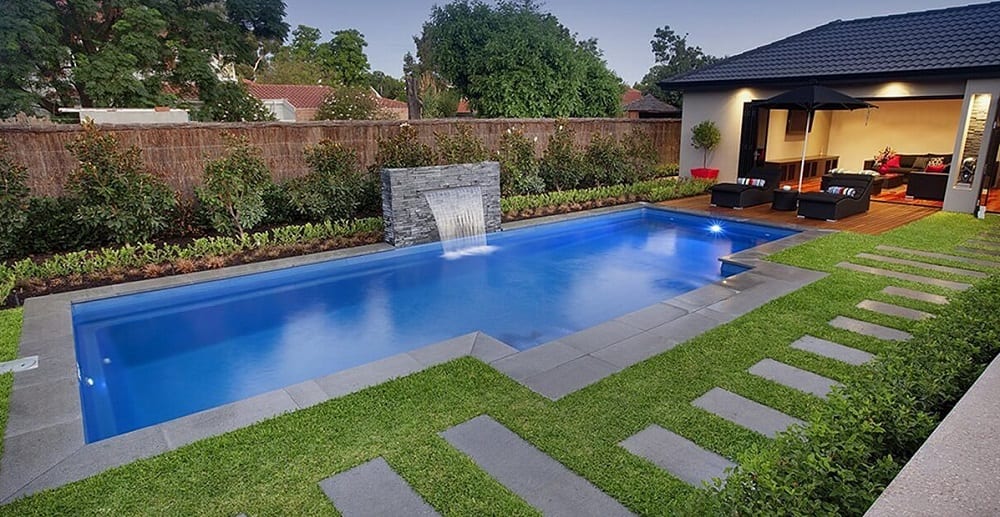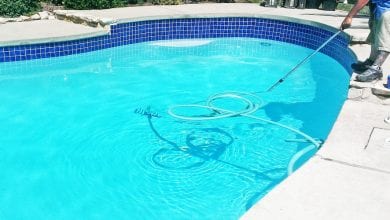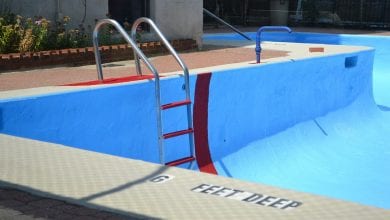
How Many Gallons Is My Pool?
A frequently asked question by pool owners is “how many gallons of water does my pool hold.” It’s a question that’s been asked by people who have just bought their pool and people who have owned their pools for many years. And it’s a question that isn’t always easy to answer. Why? Because the amount of water that the pool can hold depends on not only its dimensions but also its shape as well. A 12-foot by 30-inch round pool is going to have a different volume than a pool of the same dimensions that’s square. That’s why we’ve decided that the best way to help people is by teaching them how to figure out the number of gallons their pool holds for themselves.
To come up with the correct volume of the pool, the pool owner is going to have to take into consideration the shape of the pool and then apply the mathematical formula for that particular pool shape. The formula for volume also varies by whether the pool is a constant depth pool—meaning it’s one depth the entire length of the pool—or whether it’s a variable depth pool that has different depths. They’re also going to have to take measurements of their pool so that they can plug them into these mathematical formulas. With those facts in mind, let’s take a look at each pool shape and find out the formula for calculating the pool’s volume. All of the following formulas assume that the pool is being measured in feet.
Why Do You Need To Know Your Pool’s Volume?
Anyone serious about properly maintaining the chemical composition of their pool is going to want to know how many gallons their pool can hold. It’s simply impossible to know how many sanitizers, clarifying agents, and pH boosters to a pool if you don’t know how many gallons it is. And that’s why everyone should take the time to figure out how many gallons of water their pool holds.
Figuring Out How Many Gallons Is In Your Pool
Now that we understand why we need to know the total volume of the pool, it’s time to turn our attention to actually figuring out how many gallons are in that pool of yours. To do that, your going to have to be prepared to measure your pool and do a little bit of math. If you’re uncomfortable with the prospect of measuring and calculating the number of gallons of water in your pool, then you can either check to see if we have the shape and size of your pool listed below, or you can use one of the many online calculators available.
Rectangular Or Square Constant Depth Pools
The Formula: LengthxWidthxDepthx7.5=Number Of Gallons In Pool.
Square or rectangular pools with constant depths are some of the easiest pools to measure. All that has to be done is to measure the length of the pool times the width times the depth. This gives the pool owner the cubic feet of the pool. From there, it’s pretty straightforward to figure out the gallons found in the pool because every cubic foot of the pool is 7.5 gallons.
Example:
If you have a 12×24 foot pool with a 4-foot constant depth, then that would be 12x24x4=1,152 cubic feet. If you multiply that by the number of gallons in a cubic foot, 7.5, then you would get the following number of gallons: 1,152×7.5=8640 gallons.
Rectangular Or Square Variable Depth Pools
The Formula: LengthxWidthxAverage-Depthx7.5=Number Of Gallons In Pool.
Square or rectangular pool with variable depths are not quite as easy as the ones with a constant depth, but they’re not all that difficult either. First, the pool owner is going to have to figure out the average depth of the pool by measuring the shallow end depth and then measuring the deep end depth. Add that two figures together and then divide them by two. For example, if the shallow end of the pool is 2-feet and the deep end of the pool is 10-feet, then adding them together and dividing them by 2 will yield you an average depth of 6-feet (10+2=12/2=6).
Once you have the average depth of the pool, then measure the length and width of the pool. Now all of these numbers can be plugged into our formula to determine the number of gallons in the pool. Look at our example below to understand it better.
Example:
If you have a 12×24 foot square or rectangular pool with a variable depth of six feet, then you would multiple the numbers to come up with the cubic feet of the pool. This would be 12x24x6=1,728 cubic feet. The cubic feet of the pool would then be multiplied by 7.5 to get the gallons of water in the pool. Therefore, the 1,728 cubic feet of our example multiplied by 7.5 would yield a total volume in gallons of 12,960 gallons.
However, it should be said that this formula only works for pools that gradually change depths. For example, a pool that slowly transitions from a shallow end of 3 feet to a deep end of 9 feet. If the pool has a sudden drop-off, then this formula isn’t going to work. In those cases, it’s probably best to divide the pool in half and then measure each half separately. Once you have the gallons of each half, then you can add them together to come up with the total volume of the pool in gallons.
Circular Pools
The Formula: 3.14xRadius-SquaredxAverage-Depthx7.5=Number Of Gallons In Pool
As you can probably tell by the above formula, figuring out the number of gallons in a circular pool is a little bit different than figuring it out for a square or rectangular pool. For a circular pool, the pool owner is going to have to use the mathematical constant for a circle, 3.14, to help determine the area of the pool.
To accomplish this task, just multiply 3.14 times the squared radius of the pool, and then multiply that by the average depth of the pool. When that’s done, then the number is then multiplied by 7.5—the number of gallons per foot of the pool. We’ll provide an example of this below.
Example:
Let’s suppose that you have a circular spa that has a diameter of 10-feet. To determine how many gallons are in that spa, then you would turn that diameter into a radius by dividing it in half. That gives you a radius of 5-feet. Now to get the squared radius, all you have to do is multiply the radius by the radius. In this case, that would give you 25-square feet (5×5=25). Once you have the average depth, you can then begin plugging numbers into the equation. In this example, we figure that the spa has an average depth of 3-feet.
So, what we’re going to end up with is something that looks like this: 3.14×25-feetx3-feet by 7.5. That’s 3.14xSquared-RadiusxAverage-Depthx7.5. That gives you a total of approximately 1,766 gallons of water for a spa with a 10-foot diameter and an average depth of 3-feet.
Irregularly Kidney-Shaped Pools
Formula: 0.45x(A+B)xLengthxAverage-Depthx7.5=Number of Gallons In Pool
Of course, not all pools are rectangular, square, or circular. There are plenty of pools that are irregularly shaped. These include the kidney-shaped pools that can be occasionally found. To handle these pool shapes, we’ve included the formula for calculating the pool’s total volume. Although this formula looks complicated, it really isn’t all that bad.
First, you have to break the pool down into two smaller shapes. At the largest end of the widest part of the kidney pool measures the width. That is side A in the above equation. Then measure the widest part of the smaller end of the kidney-shaped pool. That’s your side B measurement. Now measure the length of the pool and determine the pool’s average depth. Once you have all of that information, you can then multiply it by 7.5 to get the number of gallons of water in the pool.
Example:
Let’s give you a quick example so that you understand how it works. Suppose you have a kidney pool with the combined widths of 18-feet (A+B), a length of 25-feet, and an average depth of 5-feet. You would then plug those numbers into your formula. For this example, that would be 0.45×18-feetx25-feetx5-feetx7.5. That formula would then be approximately 7,593.75 gallons.
Quick Reference Charts For Common Pool Shapes & Size
Okay, some of you who are reading this already know the size of the pool, they just need to determine how many gallons are in the pool. And many of these people aren’t going to want to have to deal with the hassle of figuring out the gallons in their pool by themselves. Fortunately, since many buy a standard size pool, then we can just list the gallons of those pools, so you can just look down the list, find your pool, and then find out how many gallons are in that pool size.
Common Above Ground Pools With A 48-Inch Wall Height
If you have an above-ground swimming pool with a 48-inch wall height (4-feet), then you’re going to want to look at the numbers we have listed in this section. Below are some of the gallons for each of these types of pools-separated by whether they’re a Round Pool or An Oval Pool.
Round Above-Ground Pools
- 15-Foot Pool=5,300 Gallons
- 18-Foot Pool=7,600 Gallons
- 20-Foot Pool=9,400 Gallons
- 24-Foot Pool=13,600 Gallons
- 27-Foot Pool=17,200 Gallons
- 28-Foot Pool=18,600 Gallons
Oval Above-Ground Pools
- 11×25-Foot Pool=6,500 Gallons
- 15×25 Foot Pool=7,800 Gallons
- 15×30 Foot Pool=8,900 Gallons
- 18×33 Foot Pool=10,600 Gallons
- 18×38 Foot Pool=14,000 Gallons
Common Above Ground Pools With A 52-Inch Wall Height
Okay, let’s continue with our common measurements of above ground pools by talking about the volume of both round pools with a 52-inch wall height (4.33-feet) and above-ground oval pools with a 52-inch wall height.
Round Above-Ground Pools
- 15-Foot Pool=5,800 Gallons
- 18-Foot Pool=8,300 Gallons
- 20-Foot Pool=10,200 Gallons
- 24-Foot Pool=15,300 Gallons
- 27-Foot Pool=18,600 Gallons
- 28-Foot Pool=20,000 Gallons
Oval Above-Ground Pools
- 11×25-Foot Pool=7,000 Gallons
- 15×25-Foot Pool=8,400 Gallons
- 15×30-Foot Pool=9,600 Gallons
- 18×33-Foot Pool=11,500 Gallons
- 18×38-Foot Pool=15,200 Gallons
Common In-Ground Pools Of Average Depth
Of course, not every pool owner owns above ground pools, but instead own in-ground pools. Since it wouldn’t be fair to only list above-ground pools, we took the time to do the calculations for in-ground swimming pools. We then separated those pools into Rectangular, Oval, Kidney & Grecian Pools.
Rectangular In-Ground Pools
- 12×24-Foot Pool=10,800 Gallons
- 16×32-Foot Pool=19,200 Gallons
- 16×36-Foot Pool=21,600 Gallons
- 18×36-Foot Pool=24,300 Gallons
- 20×40-Foot Pool=30,000 Gallons
Oval In-Ground Pools
- 16×32-Foot Pool=17,200 Gallons
- 18×36-Foot Pool=21,700 Gallons
- 20×40-Foot Pool=26,800 Gallons
Kidney In-Ground Pools
- 16×30-Foot Pool=14,900 Gallons
- 16×34-Foot Pool=16,500 Gallons
- 20×38-Foot Pool=20,200 Gallons
Grecian In-Ground Pools
- 17×33-Foot Pool=19,700 Gallons
- 17×37-Foot Pool=22,200 Gallons
- 20×36-Foot Pool=24,000 Gallons
- 20×44-Foot Pool=30,300 Gallons
Of course, the above calculations are only the beginning for many people. Some people might also want to try out some of the popular online pool volume calculators that exist out there—particularly if they have a pool that’s shaped differently than one of the ones on our list.







